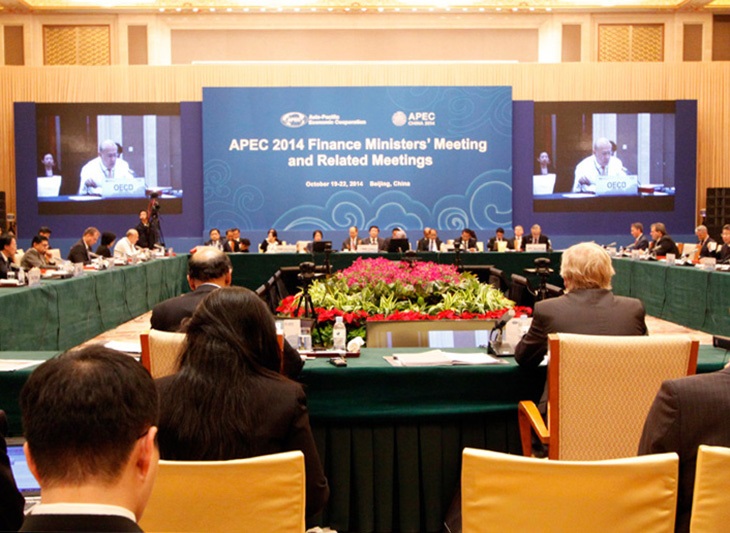Zhang: Tackle Structural Barriers to Ensure Asia-Pacific Growth

Finance Ministers from across the Asia-Pacific are deepening cooperation to tackle structural barriers to increased economic activity, better quality growth, enhanced infrastructure development and the realization of new cross-border business opportunities that support job creation and sustained global growth.
China’s Vice Premier Zhang Gaoli set the context for engagement in opening remarks at the 2014 APEC Finance Ministers’ Meeting in Beijing on Wednesday. The gathering is being chaired by China’s Finance Minister Lou Jiwei and follows a meeting between Ministers and China’s Premier Li Keqiang on Tuesday.
“The regional economy in the Asia-Pacific has maintained the sound momentum of growth, on the whole, but still faces real challenges,” cautioned Vice Premier Zhang. “In the face of risks and challenges, only reform, innovation and structural adjustment can enhance the internal driving force for growth and enable us to leave behind the international financial crisis.”
Ministers are taking stock of uncertainty created by policy adjustments in major developed economies and disorderly capital movement across borders. They are also discussing mounting external challenges facing emerging economies in the Asia-Pacific as well as difficulties related to internal structural adjustment and the unlocking of drivers to sustained economic growth.
Actions on the table are targeting greater infrastructure investment and financing, with a focus on promoting bankable public-private partnership projects. The goal is to ease bottlenecks to trade and mobility due to increasing volume of goods and people flows in region.
“Connectivity of infrastructure is an important part of our efforts to stabilize growth,” explained Vice Premier Zhang. “We must innovate financing models, actively explore public-private partnership modalities, cultivate long-term investors of infrastructure and pull adequate reserves in the Asia-Pacific into the area of infrastructure development.”
Ministers are also pursuing fiscal and taxation reform to improve access to capital needed to drive small and medium size enterprise development and integration into global value chains as well as promote research and development and the next generation of commercial innovation.
Other measures in the spotlight include the development and expansion of theAsia Region Funds Passport to facilitate the cross-border marketing of managed funds and channel more of the region’s savings into investments that fuel innovation and productivity.
“APEC economies must take targeted measures to carry out structural adjustment, improve market mechanisms and the investment environment, and energize the market,” Zhang concluded. “We should advance technological upgrading, support the growth of emerging industries and SMEs, increase competitiveness and foster new growth sources so as to build a more dynamic, more inclusive and more sustainable economy in the Asia-Pacific region.”
The 2014 APEC Finance Ministers’ Meeting will conclude on Wednesday. It will be followed by a joint Ministers’ news conference and the 2014 APEC Economic Leaders’ Week here on 5-11 November.
# # #
For further details or to arrange possible media interviews, please contact:
David Hendrickson +65 9137 3886 at [email protected]
Michael Chapnick +65 9647 4847 at [email protected]
More on APEC meetings, events, projects and publications can be found on www.apec.org. You can also follow APEC on Twitter and Sina Weibo and join us on Facebook and LinkedIn.

